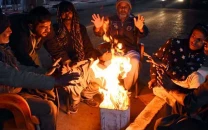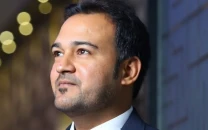Electricity providers asked to explain position to judicial commission
Utility companies in Karachi, Hyderabad and Sukkur not providing power to water supply schemes, commission told

Team of MEPCO was attacked, detained for removing electricity transformers in Khar area of Fort Munro. PHOTO: FILE
Justice Muhammad Iqbal Kalhoro of the Sindh High Court, who is heading the bench constituted by the Supreme Court (SC) to investigate the failure of the provincial authorities to supply clean drinking water and improving deteriorating sanitation conditions, ordered the CEOs of K-Electric (K-E), Hyderabad Electric Supply Corporation (Hesco) and Sukkur Electric Power Company (Sepco) to appear with explanations on April 22.
Last month, the apex court had conferred more powers on the commission to initiate proceedings for the implementation of its recommendations, orders and directives given after a six-week long judicial inquiry, as the provincial government failed to implement the same.
Potable water and sanitation: Judicial commission finds fault with reports
During Saturday’s proceedings, Deputy Secretary of the Sindh Public Health Engineering Department Riaz Hussain filed a list of water supply schemes that were lying redundant or non-functional due to the failure of the power suppliers to provide requisite power connections to them, despite the deposit of the required fee. As a result, he alleged that the people were deprived of the water.
Taking notice of the state of affairs, the commission issued notices to the K-E, Hesco and Sepco CEOs for April 22 with direction to explain why, despite the deposit of the fee, the electricity connections had not been provided to the schemes.
Earlier, the provincial chief secretary’s focal person and managing-directors of the Karachi Water and Sewerage Board (KWSB) and Water and Sanitation Authority, Hyderabad filed their reports in compliance with the commission’s previous orders.
Environmental hazard: Judicial commission inspects toxic water disposal in Kotri
The commission came down hard on the provincial government for failing to appoint a new director-general of the Sindh Environmental Protection Agency despite the lapse of the four-days given by the SC.
It directed the focal person, Dr Saeed Qureshi, to immediately contact the authorities concerned and inform the commission as to when new DG will be appointed. Dr Qureshi consulted the chief secretary and informed the commission that the new DG will be appointed within the next three working days. Justice Kalhoro ordered that the new DG will be appointed in compliance with the SC’s March 16 order and a compliance report should be submitted to the commission.
Syed Mustafa Jamal, head of the task force, submitted a compliance report in line with previous directions passed by the commission in its inquiry report regarding the revival of the dysfunctional water filtration and sewerage treatment plants across the province, including Karachi.
Judicial commission submits report after six-week-long fact-finding mission
The commission provided copies of the report to the petitioner and others concerned, who sought time to go through it and submit comments.
The commission inquired from the task force’s head about the lifting of sand from the Malir River’s bed, which is damaging the conduits of the water passing through and under the river. Jamal said proper monitoring will be ensured through irrigation department officers to ensure that no such activity takes place. He also assured that weekly reports will be furnished to the commission.
The commission also called for a report from the District Malir judge regarding the current status of lifting sand from the river after personally visiting the place along with the concerned officials. The report will be submitted in a week.
Health Secretary Dr Fazlullah Pechuho also filed a report highlighting short-term plans to implement the Sindh Hospital Waste Management Rules, 2014. In respect to the waste generated by private hospitals and laboratories, the secretary said he will direct the health director-general to ensure implementation of the law. He assured that he would apprise the commission regarding the steps taken at the next hearing.
Hyderabad commissioner to submit report on water quality
Justice Kalhoro made it clear that not only the public sector hospitals and laboratories but the private hospitals and labs are also required to follow the waste management rules. He added that ensuring the observation of such rules on the part of the public and private health facilities was the responsibility of the health secretary. Therefore, he directed the secretary to submit a comprehensive report regarding implementation of such rules by August 22.
The commission also directed Deputy Attorney-General Asim Mansoor Khan to submit a report regarding disposal of waste generated by hospitals being run by the federal government. On his request, two-weeks were granted for doing so.
The commission inquired from the chief secretary’s focal person regarding progress in shifting the management of the reverse osmosis plants from the special initiative department and Sindh coal authority to the public health engineering department, as was ordered by the SC.
The officer sought 15-days to submit the compliance report as, according to him, such change will require procedural amendment in the relevant schemes. The matter was adjourned till April 22.
The commission also issued notices to the managing-director of KWSB, Board of Revenue and Karachi Metropolitan Corporation authorities to submit reports regarding progress on repair of the treatment plant-II, in compliance with the commission’s earlier order.



















COMMENTS
Comments are moderated and generally will be posted if they are on-topic and not abusive.
For more information, please see our Comments FAQ